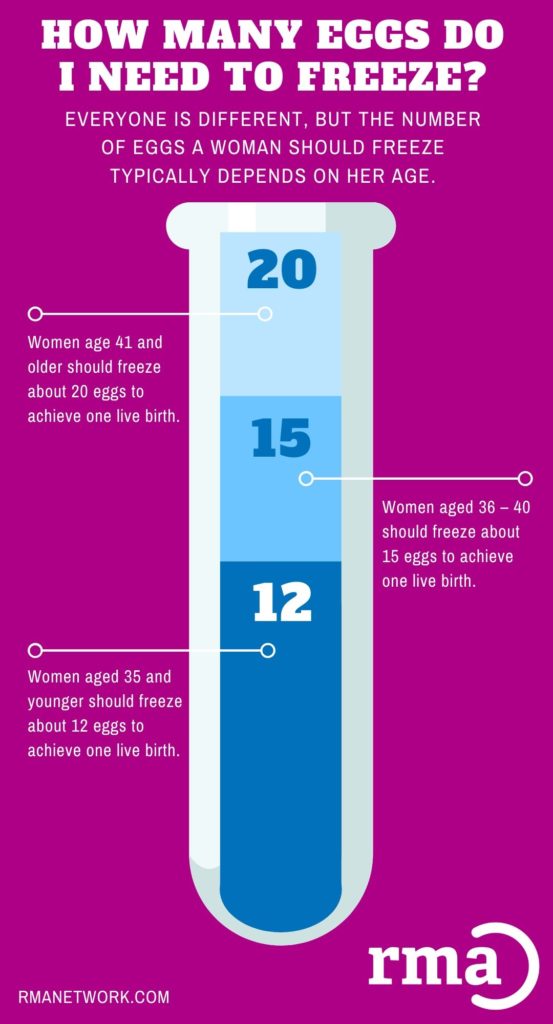Egg freezing, also known as fertility preservation or oocyte cryopreservation, is a procedure to preserve a woman’s eggs in their current state.
Between finishing grad school, trying to build your career and keeping up with friends and family, life is busy! Add all those responsibilities to the difficulty of relationships, and it’s no wonder many women are putting the idea of starting a family on the back burner.
Luckily, science has advanced so much that it’s now possible for women to delay childbirth without compromising their fertility. With egg freezing, women can press pause on their biological clocks and pursue family building on their own terms.
Women are born with all the eggs they’ll ever have, and the quality and quantity of those eggs diminish as a woman ages. By freezing and storing eggs, women are able to stop the aging process and maintain the quality of frozen eggs until they are ready for use.
Sounds simple, but is it? What else is there to know about egg freezing?
Reproductive Medicine Associates of Southern California’s Dr. Thomas Kim lists five questions to ask your fertility doctor if you’re interested in freezing your eggs.

What is Egg Freezing?
Egg Freezing has many names: fertility preservation, oocyte cryopreservation, or simply egg freezing. Whatever nomenclature you prefer to use it all means the same thing.
Egg freezing is the process in which a woman’s eggs are retrieved from her ovaries, frozen, and then stored. There are numerous reasons why a woman would decide to freeze her eggs (professional goals, educational pursuits, finding the right partner, or just are not ready for a child at the moment). Fertility preservation is a way for a woman to put her family building goals on hold until she is ready.
When should I freeze my eggs?
The quality and quantity of a woman’s eggs decline with age, so it’s best to freeze eggs before that decline begins to accelerate.
A woman is most fertile in her mid-to-late 20s, and the decline speeds up after the age of 35. For this reason, the ideal age for a woman to freeze her eggs is in her early 30s. That said, freezing your eggs at 34 is better than at 36, and freezing at 36 is better than at 40.
If you’re not sure about kids, don’t have a partner, or just aren’t ready for children yet, you might want to consider freezing your eggs.

If I want to freeze my eggs, how many eggs do I need to freeze?
Everyone is different, but the number of eggs a woman should freeze typically depends on her age. The older a patient is, the more eggs she should freeze. Here is a general guideline:
- Women aged 35 and younger should freeze about 12 eggs to achieve one live birth.
- Women aged 36 – 40 should freeze about 15 eggs to achieve one live birth.
- Women age 41 and older should freeze about 20 eggs to achieve one live birth.
What happens when you freeze your eggs?
- The first step to egg freezing is the fertility workup. Blood tests are performed to check a woman’s ovarian reserve and get a baseline understanding of how much ovary-stimulating medication will be needed to promote optimal results.
- Next, the patient will self-administer daily hormonal injections to stimulate the ovaries to grow multiple follicles. During this time, the patient will be seen in her doctor’s office for an ultrasound and bloodwork monitoring to make sure the medication is performing its intended purpose.
- After about 10 days, the patient will undergo a quick outpatient procedure called egg retrieval. During the retrieval, her doctor will extract as many mature eggs as possible to cryopreserve.
- Once the eggs are frozen, they will remain in their current state. The patient can come back when she’s ready to build a family and use her younger, frozen eggs to create an embryo via In Vitro Fertilization (IVF) and pursue pregnancy.
Has your center had successful live births using frozen eggs?
This is a critical question that most patients don’t think to ask. Freezing the eggs is only half of the equation; the other half is the ability to thaw the eggs and create embryos that lead to a successful live birth. At the end of the day, patients are freezing their eggs with the intention to have a baby down the line, so this is vital information to have!
There are several factors that lead to a successful pregnancy and live birth using frozen eggs.
Freezing method
Patients should find out what freezing method their fertility clinic uses.
At the RMA Network, we strictly use vitrification, which is the most advanced and reliable method available and produces optimal results. Other clinics may still use the slow-freeze method, which has shown to be less successful.
Lab Quality
Not all labs are created equal. The caliber of the embryology laboratory is vital in determining success. At RMA of Southern California, we use the most advanced technology with the most trusted processes to ensure success during freezing and thawing of eggs, along with the creation and growth of embryos.
From the materials used inside the laboratory, to the way eggs and embryos are handled, to the timing of various highly-sensitive steps, to every difficult-to-perfect variable in between, RMA of Southern California has made every effort to ensure our laboratory performs to the highest standards possible.
Is egg freezing covered by insurance?
Patients should make sure to check with their insurance provider and employer HR department to see if they have fertility benefits. Luckily, more and more employers are offering egg freezing and IVF coverage to their employees. In addition, companies like Progyny partner with many employers to extend fertility benefits to those in need.
Egg freezing is an empowering option for many women. To learn whether it is right for you, we encourage you to make an appointment with a fertility doctor.
To learn more about egg freezing or to schedule an appointment with your local RMA, please call 424-293-8841 or Request an Appointment online.




